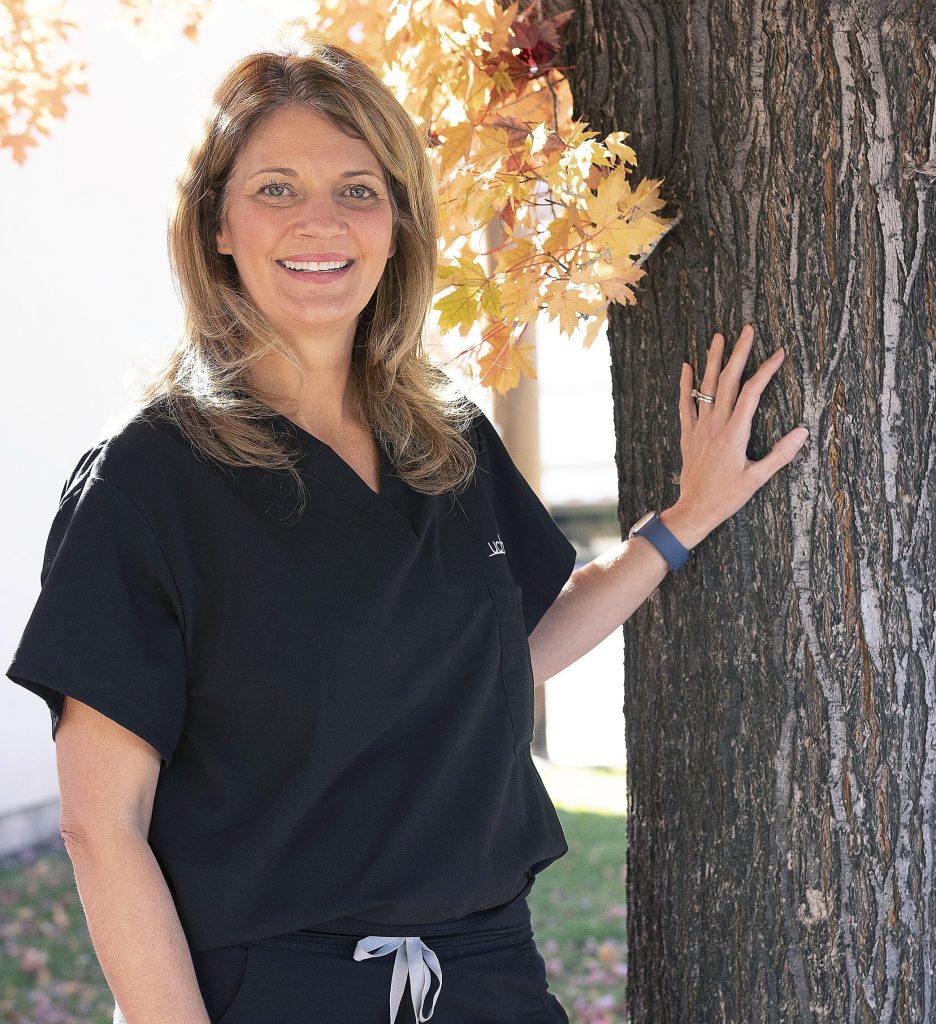Doctors say dietary health important to reduce breast cancer risk
Menopausal hormone therapy not a significant increased risk

UCHealth/Courtesy photo
Patients wanting to lower their risk for breast cancer should focus on eating a clean and healthy diet, getting sufficient exercise and maintaining proper body weight, said Dr. Laurie LeBleu Vaszily at UCHealth Women’s Care Clinic.
Those measures are more important to reducing breast cancer risks than a woman’s possible qualms about taking hormones to help maintain overall health.
LeBleu advises patients to avoid eating highly processed foods and to get enough exercise to stay heart healthy and maintain a healthy body mass index, which is the measure of body weight in relation to height.
“The more fat in your body, the higher your risk is going to go,” LeBleu said of breast cancer concerns.
LeBleu pointed to everything from fast food to chips as highly processed foods to avoid. She recommends patients with a family history of breast cancer to pursue a whole food or plant-based diet with as many organic foods as possible, or at least to eat whole foods, fresh fruits and vegetables, and organic meats.
“If food doesn’t look like what it came from, then you probably shouldn’t eat it,” LeBleu noted.
Experts within the past five years confirm that women using menopausal hormone therapy to help with significant post-menopausal symptoms only add an approximately 1% increased risk of breast cancer, LeBleu explained.
“There is less than 1% increased risk of breast cancer with combined estrogen and progesterone menopausal hormone therapy,” LeBleu said. “There is no added risk of breast cancer with estrogen-only menopausal hormone therapy.”
Dr. Laurie LeBleu Vaszily advises patients concerned about lowering their risk for breast cancer should focus on eating a clean and healthy diet, getting sufficient exercise and maintaining proper body weight. Women should not be scared to consider use of patient-individualized menopausal hormone therapy to help them stay physically, mentally and socially active and healthy because the improved quality of life benefits outweigh the risks.
Using hormones younger in life for oral contraception pills adds less than 1% increased risk for breast cancer, the doctor said.
The doctor practicing in Steamboat Springs and Craig advises patients not to be scared to consider the use of patient-individualized menopausal hormone therapy to help them stay physically, mentally and socially active and healthy because the improved quality of life benefits outweigh the risks.
Women with significant post-menopausal symptoms when natural hormone levels drop may feel numerous impacts to their mental health, sleep and energy, so they in turn may eat poorly, not exercise sufficiently and gain weight, leading to a higher risk of breast cancer, LeBleu explained.
Some benefits to menopausal hormone therapy include prevention of bone density loss and possible broken bones and lowered risk for cardiovascular disease and Type 2 diabetes, according to The Menopause Society.
LeBleu encourages patients to discuss menopausal hormone therapy options by scheduling a specific 30-minute hormone review appointment with a knowledgeable gynecologist. Patients should bring along the health history of their mother, grandmothers and sisters, including types and ages of onset for cancers, heart disease, osteoporosis, diabetes and clotting disorders.
“For best results, menopause hormone therapy should be tailored to each person,” according to Mayo Clinic. “You also should review your use of hormone therapy regularly with your health care professional to make sure the benefits still outweigh the risks.”
Dr. Jill Liss, an associate clinical professor in obstetrics and gynecology at the University of Colorado Anschutz Medical Campus, encourages women experiencing significant menopausal symptoms not to suffer in silence.

“There are so many safe and effective treatments available, tailored to each person’s cancer history and symptoms,” Liss said. “If you’re struggling, seek out care from someone experienced in menopause after breast cancer. You don’t have to just put up with it.”
Women’s health experts previously advised patients to limit the use of menopausal hormone therapy to five years, but current advice is that carefully prescribed therapy can continue long term, coupled with healthy lifestyle habits and regular breast screenings, LeBleu said.
“So, hormones and breast cancer concerns really are minimal now unless you have breast cancer,” LeBleu said. “Menopausal hormone therapy should not be scary.”
When a patient is diagnosed with breast cancer, approximately 70-80% are hormone receptor-positive, according to the Susan G. Komen organization. That means naturally occurring hormone estrogen can bind to the cancer cells and cause the cancer to grow. In those cases, oncologists direct breast cancer patients to stop any systemic hormone additive therapy.
Although estrogen does not cause breast cancer, “estrogen feeds breast cancer if it’s estrogen-positive,” LeBleu said.
Patients with hormone receptor-positive breast cancer who have not already undergone menopause may choose to have their ovaries removed to prevent the body’s production of estrogen, LeBleu noted.
Hormone receptor-positive breast cancer patients commonly are prescribed medications that reduce the level of bodily hormones or block hormones from binding to cancer cells.
“The breast cancer cells have receptors (proteins) that attach to estrogen and progesterone, which helps them grow,” according to the American Cancer Society. “Treatments that stop these hormones from attaching to these receptors are called hormone or endocrine therapy.”
Hormone-blocking medications that can help keep breast cancer from coming back can have negative side effects on women’s health. Those women can use topical estrogen applied locally in the vaginal area for specific issues such as dryness.
“This is strongly supported by national guidelines from the American College of Obstetricians and Gynecologists and The Menopause Society,” Liss said. “Vaginal estrogen is safe and effective even in people with a history of breast cancer.”
Trying other alternative, safe remedies such as phytoestrogen — a plant-derived compound that mimics bodily estrogen — may alleviate some menopausal symptoms, LeBleu said.
Liss recommends a drug called Veozah as a non-hormonal option for hot flashes that “works on the neurokinin pathway in the part of the brain that regulates body temperature and that goes a bit haywire in the absence of estrogen.”
“It’s safe for breast cancer survivors,” Liss said. “And there’s a new drug, Lynkuet, anticipated to be available in October, that works similarly and also is effective with sleep.”
Annual basic screening mammograms are recommended by such agencies as the American College of Obstetricians and Gynecologists to start at age 40 for women.
A prescription/order by a medical professional is required to start those annual screenings at both Memorial Regional Health in Craig and UCHealth Yampa Valley Medical Center in Steamboat Springs. Women with a first-degree family history or other breast health concerns can speak to their doctor about the possibility of starting annual mammograms earlier than 40.
To schedule a mammogram at Memorial Regional Health, call 970-826-3150. As of January 2026, a prescription will not be required for subsequent screening mammograms after the first screening year.
To schedule a mammogram at Yampa Valley Medical Center, call 970-871-2399. After the first year, a prescription is not required for a screening mammogram.
New cases of invasive breast cancer among women ages 40 to 49 increased by an average of 2% per year from 2015 to 2019, demonstrating the importance of earlier screening in identifying cases, according to the ACOG.
According to the American Cancer Society, this year, an estimated 316,950 women and 2,800 men in the U.S. will be diagnosed with breast cancer. Regular screening can find breast cancer earlier that can be easier to treat.
To reach Suzie Romig, call 970-871-4205 or email sromig@SteamboatPilot.com.

Support Local Journalism

Support Local Journalism
Readers around Steamboat and Routt County make the Steamboat Pilot & Today’s work possible. Your financial contribution supports our efforts to deliver quality, locally relevant journalism.
Now more than ever, your support is critical to help us keep our community informed about the evolving coronavirus pandemic and the impact it is having locally. Every contribution, however large or small, will make a difference.
Each donation will be used exclusively for the development and creation of increased news coverage.










